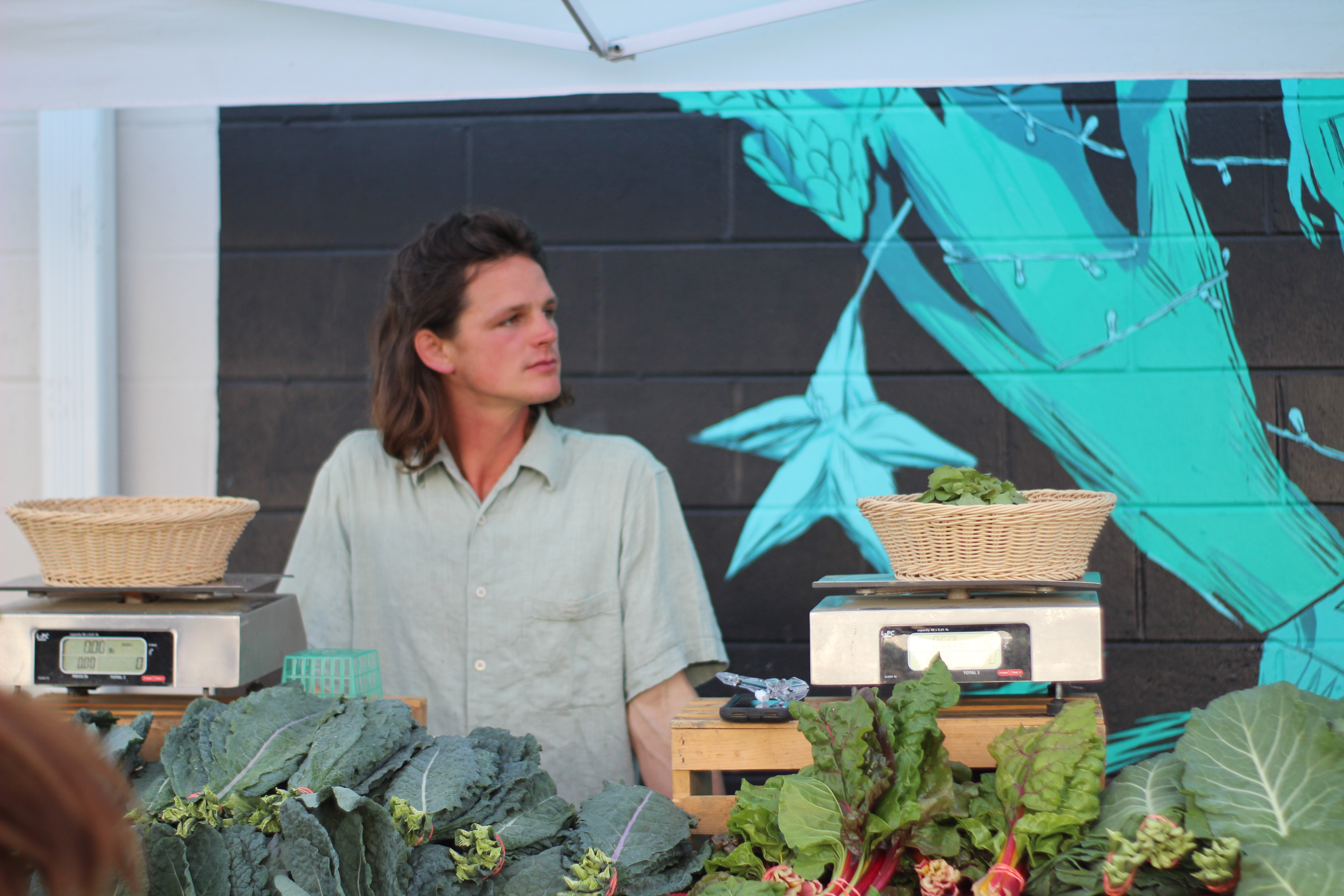When the sun rises and many people are still fast asleep, Matthew Schneider and the other employees of the Hickory Hill Farm are already awake and working in the fields. From 7 a.m. to noon or later, Schneider harvests produce that he will later sell at the Athens Farmers Market.
Schneider is the field manager at Hickory Hill Farm in Carlton, Georgia.
At the bustling market on Wednesday afternoon, Schneider stands behind the register with his dog and waits for people to buy his produce. On this day he’s selling a variety, from green garlic and turnips to bok choy, strawberries and herbs.
Hickory Hill is certified organic, meaning it is registered with and complies with the USDA certified organic qualifications.
According to Schneider, the goal of organic farming is to manipulate the crops in as small of a capacity as possible.
The best case scenario is we plant it, we walk away and don’t have anything to do at all.”
Of course, however, this isn’t always possible.
“There are some things that are just really notoriously hard like strawberries,” he continues. “They still have to be sprayed every week with organic fungicides and organic pesticides, if you will.”
Schneider explains that organic certification acts as a ticket into the more lucrative farmers markets in the area.
“I almost feel like the certification is more of like a stepping stone,” he says, as he counts change for a customer.
I mean, yes, they are obviously interested in sustainable farming, but the certification is more just for being able to get entrance into the markets,” he said.
The Athens Farmers Market requires that all vendors be either certified organic or certified naturally grown. Certified naturally grown is peer-reviewed alternative that costs less and takes less time to attain than becoming certified organic.
Certified organic is regulated through the USDA. It takes a long time to become certified organic and the process is expensive. Certified naturally grown is a peer-to-peer certification process that is recognized by but not regulated through the USDA.
Of the 42,257 farms in Georgia, 135 are Certified Organic and 117 are Certified Naturally Grown.
Athens Farmers Market manager Sarah Thurman says that including farms that are Naturally Grown as well as Organic creates less of a barrier to entry for smaller-scale farms.
Athens Farmers Market
A cornerstone value of the mission of the Athens Farmers market is sustainability. Thurman says that sustainability is multifaceted and takes on different meanings in different contexts.
When most people think of sustainability, environmentalism often comes to mind. As part of the bylaws for the Athens Farmers Market, every farm that sells produce must be certified organic or certified naturally grown.
Sustainable farming practices are practices that nurture the land for the long term.”
Organic and naturally grown farms refrain from using chemical fertilizers, herbicides and pest controls.
“We allow biodiversity to maintain its place in the growing environment,” says Thurman, “and you know, whether the farmer continues to farm in the years going on, the landscape is still alive and it’s still something that can continue to grow and thrive.”
However, for Thurman, sustainability goes beyond using environmentally friendly farming techniques. She also sees a need in the Athens community for promoting sustainable economic practices, as well as practices for sourcing produce.
Particularly, the Athens Farmers Market only sources produce from surrounding counties; the farthest farm that sells produce at the Athens Farmers Market is in Washington, Georgia according to Thurman.
“Our farmers are, you know, growing locally and have, you know, an intimate vested interest in the health of the farmers market, which makes it, you know, a sustainable resource for fresh food,” says Thurman.
Athens Land Trust
Director of Community Agriculture for the Athens Land Trust, Travis Williams, similarly breaks up sustainability in terms of environmental, economic, and human consequences.
The Community Agriculture Program is a network of ten gardens with a goal of “developing a sustainable local food system in some of Athens’ most food insecure communities.”
For Williams sustainability includes helping people build businesses that are economically viable, environmentally friendly, and helps community members engage in the local food system for the long-term.
Williams oversees Young Urban Farmers, which teaches 14-to-18-year-olds agricultural and entrepreneurship skills geared towards operating farms and selling produce.
“Our target audience is youth who live in low-income households, and empowering them to be able to have their own purchasing power to alleviate some of the burden from the parents, and also give that child a sense of personal responsibility,” says Williams.
Williams’ goal for the Community Agriculture Program is to eventually be zero waste with a small carbon footprint.
Access and Affordability
The Athens Farmers Market strives also to create sustainable access to fresh food for people in the Athens community who live in poverty. AFM accepts SNAP benefits—also known as food stamps—and will double SNAP benefits for people at the farmers market. The match system effectively will give someone 100 dollars of purchasing power if they come to the market with 50 dollars of SNAP benefits.
Coupled with its goal of education, the AFM also takes part in a preventative healthcare program that works to provide access to and educate low-income customers about food.
The Athens Farmer’s market, partnered with local healthcare providers, offers a program called FARM RX (Food As Real Medicine RX). The program provides low income individuals who struggle with diet-related illnesses with prescriptions for fresh fruits vegetables that can be redeemed at the Athens Farmers Market.
FARM RX deals with food insecurity in Athens by addressing participants’ difficulties with eating fruits and vegetables. These difficulties include availability, cost, time available for food preparation, and knowledge of preparation.
Through this program, the Athens Farmers Market provides monthly cooking classes and meetings. These meetings help participants acclimate to purchasing, eating, storing, and preparing fresh produce.
Difficulties of 21st Century Farming
The breakdown of generational farms coupled with a societal shift away from encouraging young people to farm hurts the farming industry, Schneider says.
Schneider says that on top of making little money compared to other more traditional careers, farmers face stigma and a lack of generational knowledge that used to be passed down to farmers. He says that it’s particularly hard to make a living working on smaller organic farms.
“You have to overcome people telling you that it’s a bad decision, you have to overcome the fact that you don’t know anything about it, and then you have to overcome the fact that you’re going to make pretty much very little money doing it,” Schneider says.
And Schneider is right. On average, organic farmers make between $24,500 and $37,600 per year, while non-organic farmers make between $37,300 and $118,300 per year.
I would almost argue that like, we’re in dire, dire times because it’s so hard for people to farm,” he said.
“People just don’t value food enough,” Schneider says. “I think they want to value food, but at the end of the day, the people who are producing food just make so little money.”
However, Schneider says that, for him, the positives outweigh the negatives.
“The reason people do it is because you get to be outside, because you get to be around plants, and it’s quiet and you don’t have to sit in traffic,” Schneider says, smiling at his next customer as he counts out their change.
Raphaëla Alemán is a journalism and cognitive science major at the University of Georgia.








